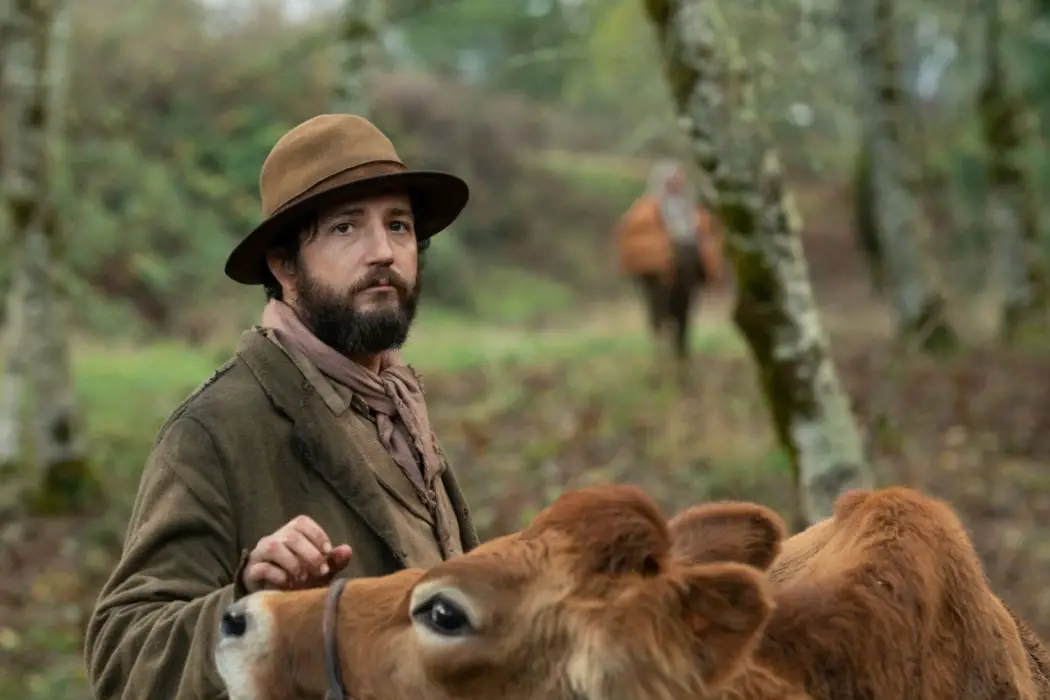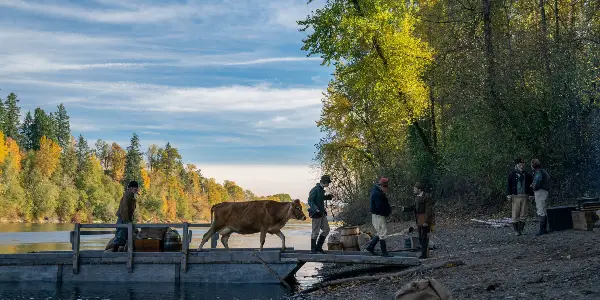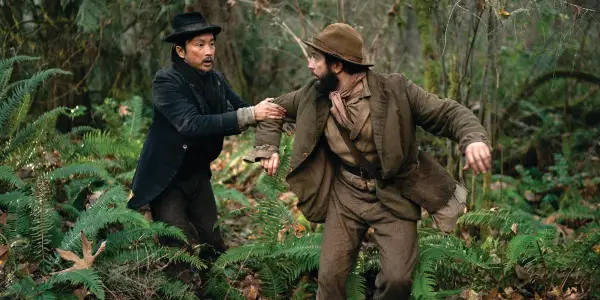FIRST COW: A Tender Portrait Of Comradeship And American Dream

Reyzando Nawara is a passionate film and TV enthusiast from…
There are no other directors quite like Kelly Reichardt at the moment. An American auteur born and raised in Miami, Reichardt‘s movies are often small and symbolical; quiet and meditative; thematically rich and emotionally stirring. From male friendship and womanhood to poverty and inequality, Reichardt has explored plenty of interesting subjects throughout her impressive 25 years of career. But one big topic that’s always been present in all her movies is American life and the struggles that come with it, generally told from the perspective of the oppressed.
Her latest feature First Cow is no different. Here, she tackles the early days of American capitalism and how it takes shape in the 19th century, and while doing so, she gives us a moving tale of companionship. Yes, thematically, what First Cow explores here is not something that we haven’t seen from Reichardt‘s movies before — Old Joy and Meek’s Cutoff will without a doubt come to mind. But where her other movies are usually filled with a sense of dread and impending tragedy looming under the characters’ journey, the tone of First Cow is warm and fuzzy until the very end that watching it unfolds is like going through a soothing meditation.
Two Outcasts Vibing Together
Loosely adapted from the novel The Half-Life by Reichardt‘s frequent collaborator Jon Raymond, First Cow begins in the present day, with a fleeting yet memorable cameo from Alia Shawkat. In a scene that will recall Reichardt‘s best film to date, Wendy and Lucy, we see this unnamed woman and her dog digging through the dirt and discover two male skeletons while they’re on an Oregon trail. But before we know the answers to whose skeletons it is and what would be its significance to the story, the movie transports us back to 1820 with the introduction of Otis “Cookie” Figowitz (John Magaro), a baker from Maryland who makes a living by feeding fur-trappers.

When we first meet him, we know right away that despite his rough look, Cookie is not like the men he travels with; he’s gentle and kind where the hunters are hostile. But even when he is treated as the punching bag of the group, Cookie is still there doing his job as a cook with all his heart. It’s during one of his late-night mushroom-foraging sessions that Cookie first encounters King-Lu (Orion Lee), a naked Chinese immigrant hiding from the Russians seeking to avenge the death of one of their people.
Typically, if we’re talking about mainstream Western movies, Cookie would report the man to this group instead of helping him, then you can probably guess what will happen next. But First Cow, thankfully, is not that kind of movie, and Reichardt is certainly not the kind of director who pursues a generic formula. So it shouldn’t come as much of a surprise that what entails from Cookie and King-Lu’s first meeting is the beginning of a beautiful friendship and partnership between two outcasts trying to milk the opportunity that the promised land of America seems to offer them — an opportunity that comes with the arrival of the first dairy cow in Oregon.
King-Lu sees this cow as a way to get him and Cookie closer to their dreams of opening a bakery and a hotel in San Francisco. Problem is, the cow does not belong to the community; it is owned by the wealthy Englishman, Chief Factor (Toby Jones) who rules the territory and controls all the trading processes there. This, however, doesn’t stop King-Lu to get what he wants. In fact, he proposes a scheme to Cookie that they would sneak off at night to milk the cow so that Cookie could use it to make “oily cake” they would sell at the market the next day. Of course, it’s a very risky idea, but when you have nothing to lose anymore, a bad idea is always better than no idea at all.

On lesser hands, the machinations to Cookie and King-Lu’s plan, as well as the answer to whether they will get caught or not, would unquestionably be the main points in which the movie revolves around. But First Cow, until its final moment, is much more interested in the central relationship of its two main characters a lot more than the heist itself. So even when things get plot-heavy toward the second part of the movie, like when Cookie and King-Lu are hired to make a clafouti for Chief Factor, it’s their friendship that remains at the front and center of the story, hammering home the emotional beats that Reichardt has laid out since the get-go.
Not only is it moving to see these two guys support each other despite their different worldviews, but it’s also rare to witness this kind of male relationship on-screen. There is no hyper-masculinity on display, nor is there an overtly complicated conflict between the two. What’s offered here is just a sincere portrait of two people bonding over the same needs and dreams; looking out for each other in a land that gives people like them nothing but rejection and sorrow, strengthened even more with grounded performances from Magaro and Lee. The former, in particular, brings such an amazing display of sensitivity in an understated but beautiful performance that hopefully will garner some attention comes awards season next year.
Capitalism on the American Frontier
Wonderful as it is to see all the small details of Cookie and King-Lu’s relationship, what, in the end, makes First Cow all the more remarkable is the sharp critique toward American capitalism at the center of the story. The movie argues that the issues between the haves and the have-nots, as well as the tension between class and race, that our modern society is dealing with right now has also happened centuries ago. And it’s made even more explicit with the way Reichardt integrates the titular cow into the dynamic between Chief Factor with all the other characters — not just with Cookie and King-Lu, but also with the small ones like the Native Americans that are represented by Lily Gladstone‘s character.

First Cow presents us with a reality where in order to get more money you need to have money first. Chief Factor, with his sole access to the cow, symbolizes this notion. So in the end, it’s only the people like him who are able to gain wealth while people like Cookie and King-Lu will stay at the bottom of the hierarchy unless they do something risky about it, like stealing the milk from the haves just to get a slightly better life even just for a day or two.
Of course, Reichardt doesn’t justify the heist that her two lead characters are doing throughout the movie. But she also doesn’t judge their actions. If anything, it’s through Cookie and King-Lu’s act of crime that Reichardt is able to drill home the irony of the situation that she tries to address in the first place; where stealing seems small compared to the ugliness of American capitalism and colonialism that the movie smartly but subtly tackles underneath its main story.
The Bond We Made Along the Way
Still, even when its criticism of capitalism gets more apparent upon closer inspection, what stays beautiful about First Cow is that it doesn’t try to do so in a fleshy and aggressive manner. Everything remains unhurried and low-key, with its portrait of male companionship dominantly filling up space until the very end.
Maybe, in a world defined by our needs for money, what’s actually important is the bond we made along the way with other people. Isn’t it beautiful if that’s true?
What do you think of First Cow? Let us know in the comments below!
First Cow is now available on VOD.
Watch First Cow
Does content like this matter to you?
Become a Member and support film journalism. Unlock access to all of Film Inquiry`s great articles. Join a community of like-minded readers who are passionate about cinema - get access to our private members Network, give back to independent filmmakers, and more.
Reyzando Nawara is a passionate film and TV enthusiast from Indonesia. When he's not watching TV and movies, he likes to cook and make sorbet.













